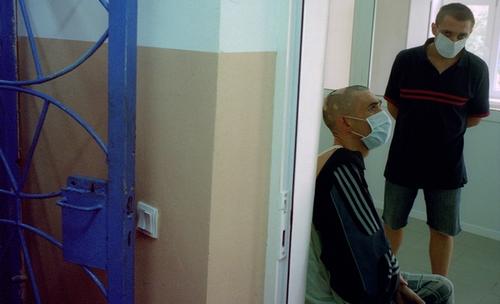Since June 2012, MSF has been treating prisoners and ex prisoners with drug-resistant tuberculosis (DR-TB) in the Donetsk region of Ukraine. Paola Mermati, MSF’s Field Coordinator in Donetsk, talks about the challenges of treating such patients successfully.
How are these patients different from others?
The rate of TB here in the Donetsk region is ten times higher in the prison system compared to society in general. Inmates often come from a deprived environment, with difficult family histories and experiences of social marginalization due to their social and heath status. Some of them have psychological disorders, and many are drug users and alcoholics. Some are infected with HIV, often as a result of sharing needles with other drug users. That is why it is extremely important to address TB in the prison system where it’s most concentrated and where patients are most neglected.
What are the challenges in treating these patients?
Unfortunately, the DR-TB drugs that exist today often carry with them very painful side effects, such as vomiting, nausea, psychiatric symptoms and loss of hearing and vision. Treatment can be extremely long and painful – in the worst case it can take up to three years to be completed. You can imagine how difficult it must be for anyone to go through all this. This is even more so if you are a prisoner with addiction problems who has very little hope in the future. The prisoners also know they can be released earlier if their health conditions get really critical, which for some is an incentive not to take treatment. To motivate them to stick to treatment is not easy, even though the disease is deadly.
What is MSF doing to overcome these challenges?
We are investing a lot in patient support and psychological counseling, so that patients can understand why it’s so important that they continue the treatment. We are also putting effort into gaining trust within the prison population, as most prisoners are unfamiliar with MSF and humanitarian work. Once patients have been released from prison, we also have a special team that provides support when they have to readapt to civil society. For example, if a patient doesn’t have anywhere to stay, we try to find structures which accept them, so that they don’t end up living on the street. We are constantly advocating to improve this situation in order to ensure that the living conditions are the best possible for patients to continue treatment.
What would MSF like to see happen on a wider scale in Ukraine in terms of addressing TB?
Despite being a treatable disease, only half of the estimated number of people infected with DR-TB in Ukraine are being initiated on treatment. Factors that contribute to the epidemic include a lack of qualified human resources, insufficient supply of drugs, scarce access to diagnostic tools, and poor follow up of patients defaulting from treatment . All this has to be addressed better, especially in the prison system, so that more people are put on treatment, and their adherence is improved. In prisons, more focus needs to be put especially on early diagnosis and strengthening infection control measures, so that infected prisoners do not transmit the disease to others. That’s why MSF is here - to share its TB expertise with the Ukrainian system and to try and change things for the better.
MSF’s activities in Ukraine
Since June 2012 MSF provides treatment to prisoners and ex-prisoners in Donetsk region in eastern Ukraine in order to help tackle the growing epidemic of drug-resistant TB (DR-TB). MSF provides treatment to around 230 prisoners in Colony 3 (a special prison hospital for inmates with TB) and in three pre-trial detention centers. Once patients are released from prison, MSF offers continued treatment until they are cured. In addition, MSF provides antiretroviral treatment to patients that are co-infected with HIV. Activities are carried out in collaboration with prison authorities and the Ukrainian Ministry of Health.
Drug-resistant TB (DR-TB)
DR-TB is used to describe strains of TB that show resistance to one or more first-line TB drugs. DR-TB is difficult to treat, as the treatment is expensive, has strong side effects and needs to be taken for a long duration.
Updated 19 Febrary 2014
Since this morning, MSF has one surgeon working in a non-governmental health facility near Maidan square in Kiev. Since his arrival, there have been six wounded treated at the facility, receiving minor surgery for bullet- and blast wounds as well as fractures. MSF is also planning to make donations of medical equipment such as operating table and a number of wheelchairs to a number of state hospitals around Kiev. MSF keeps monitoring the situation to assess if further assistance is needed.
MSF is a neutral and impartial organisation and does not take a political position in favour or against one side or the other. MSF is solely working to deliver medical care to people who are in need.
Since 2012, MSF is running a tuberculosis project in the Donetsk region, in the east of the country, which is continuing as normal.



